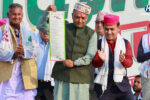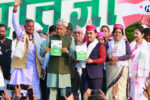KATHMANDU: Dr Mohammad Tarikul Islam is an Associate Professor of Government and Politics at Jahangirnagar University in Bangladesh. Khabarhub talked to Dr Tarik on bilateral relations between Bangladesh and Nepal. Excerpts:
Are bilateral relations between Bangladesh and Nepal based on mutual trust and confidence?
Bangladesh and Nepal, two South Asian countries having different ecological conditions, social systems as well as historical and cultural backgrounds, are perceived to have sound and smooth progress of their bilateral relations.
These bilateral relations, featuring equal and sincere treatment, mutual support and friendship for generations, can be an example of good associations between two countries.
It is noticeable that since the very beginning of the establishment of diplomatic relations, Bangladesh-Nepal relations were characterized by ties at the people’s level.
The relations have improved and the major stake in them lies in strengthening border areas and in improving people-to-people contact and furthering economic relations and trade.
Setting up of offices has enabled passenger movement through the route – so far being used only for cargo movement.
Since the establishment of diplomatic ties, bilateral relations between Nepal and Bangladesh have been characterized by cordiality, goodwill, mutual understanding and shared values and aspirations of the people.
Are mutual relations between Bangladesh and Nepal getting stronger with new cooperation in different sectors?
Of course. For instance, Pradeep Kumar Gyawali, Minister of Foreign Affairs of the Government of Nepal came to Bangladesh in February 2020 on an official visit and joined bilateral talks with AK Abdul Momen, Minister of Foreign Affairs of the Government of Bangladesh followed by a courtesy call to Bangladesh Prime Minister Sheikh Hasina on 19 February 2020.
So far I know, Momen and Gyawali led Bangladesh and Nepal delegations in a meeting that reviewed different aspects of bilateral relations.
The parties exchanged views on further expanding and strengthening cooperation and discussed the expansion of two-way trade through the removal of tariff and non-tariff barriers, simplification of administrative procedures, facilitating measures at border points; development of multi-modal connectivity networks; improved transit facilities and promotion of investment; collaboration in tourism promotion; enhancement of cooperation in the energy sector; and promotion of cultural cooperation and furthering cooperation in the education sector.
Bangladesh expressed hopes that a high-level visit from Nepal would take place in the near future.
Bangladesh prioritizes cooperation with its neighbors, emphasized the Prime Minister while talking to the visiting Foreign Minister of Nepal in February 2020.
Access to Bangladesh’s airport and seaport is part of its commitment to regional connectivity for shared prosperity.
Prime Minister Hasina had consistently advocated for transit facilities for Nepal as part of Dhaka’s campaign for enhanced regional connectivity under the Bangladesh-Bhutan-India-Nepal (BBIN) initiative.
The state visit of the Honorable President of Bangladesh to Nepal in late 2019 had opened a new horizon of the relationship between the two countries.
Nepal-Bangladesh Joint Economic Commission (JEC) was set up at the level of Finance Ministers in 1978. The areas of cooperation are joint venture sectors like banking, finance and insurance.
New initiatives are being undertaken in the field of readymade garments, leather goods, pharmaceuticals, and PVC pipes. Nepal and Bangladesh signed an Agreement on the Avoidance of Double Taxation and the Prevention of Fiscal Evasion with Respect to Taxes on Income on 5 March 2019.
The fourth meeting of the Nepal-Bangladesh Technical Committee for the promotion of trade between two countries was held in October 2019 in Kathmandu.

Likewise, the fifth Nepal-Bangladesh commerce secretary-level meeting was held in Dhaka on 3-4 March 2020.
I must appreciate the Government of Bangladesh for keeping a certain number of seats reserved for Nepali students in the fields of medicine and engineering every year.
In addition, hundreds of Nepali students have been pursuing higher studies on a self-finance basis largely in medical, dental science and engineering fields in various institutions of Bangladesh.
How does economic diplomacy accelerates the volume of bilateral trade?
Nepal’s relationship with Bangladesh is unique. Economic and commercial relations between these neighbors have been growing steadily over the years.
However, the volume of bilateral trade has not seen much improvement despite tremendous potentials for expanding and diversifying trade between the two countries.
The essential thrust of our economic diplomacy should be increased in an effort to enhance the image of the country.
Nepal and Bangladesh share similar views on various issues and work closely in many regional and international forums, including the UN, NAM, SAARC and BIMSTEC.
Nepal-Bangladesh commercial and economic relations are increasingly growing to our mutual benefits and exchanges at the people to people level are expanding.
The Bangladesh government permitted Nepal to use the port facilities at Mongla since September 1997, following the opening of the Kakarbhitta-Phulbari-Banglabandha transit route.
Nepal-Bangladesh Joint Economic Commission (JEC) was set up in 1978 at the level of Finance Ministers. Since the activation of JEC, both countries have been keen on further strengthening economic ties.
The areas of such cooperation have been joint venture sectors like banking, finance and insurance. New initiatives are being undertaken in the field of readymade garments, leather goods, pharmaceuticals and PVC pipes.
Commerce Secretaries of both countries held discussions at Kathmandu on 29-30 July 2012. It was agreed to bind a timeframe for the conclusion of operational modalities for the carriage of transport between two countries.
The prevailing relations between two neighboring countries are also guided by the SAARC mandate and diplomatic affiliation with the regional force, India.
Bangladesh and Nepal have a very good bilateral trade relation. Nepal imports around 90 percent of goods to meet local demands.
The market is dominated by India but Bangladesh has a big opportunity to grab market share. Consumer goods, plastic products, batteries, construction materials, furniture, electronic goods including refrigerator, television and home appliance, motorcycle, melamine products and footwear are being exported here.
What are the major challenges you perceive towards deepening the bilateral relations?
Let me mention a couple of significant challenges with a brief explanation. India has agreed to allow Nepal to trade with Bangladesh through its territory, but bureaucratic hurdles and lack of infrastructure have not allowed the arrangement to work.
Perhaps the India-Bangladesh memorandum of January 2010 indicates New Delhi’s commitment to forcing compliance with its bureaucracy and kick-start a process on infrastructure building.
Bangladesh needs to ensure that its imports are not held hostage to the monopoly of a selected few producers, but are instead received through rigorous international competition.
Even though the economic logic in strengthening trade and transit relations between Nepal and Bangladesh is clear enough, little has happened so far other than policy concessions that seem out of touch with ground reality.
Discussion and concurrence of both countries in principle for use of Mongla port in Bangladesh for transporting goods to and from Nepal at a concession rate would help promote tourism, travel agents and tour operators from both countries could also jointly coordinate necessary steps.
The positive attitude of both countries to give final shape to a deal on operational modalities for goods-carrying vehicles in order to ease transit facility to Chittagong and Mongla port remains an assenting sign in strengthening trade relations.
Is the government of Bangladesh fostering the concept of economic diplomacy?
Yes, of course. Bangladesh prioritizes economic diplomacy in its foreign policy formulations.
At the Bangladeshi envoy’s conference, held in July 2019 in London, Prime Minister Sheikh Hasina had asked Bangladeshi envoys based in European countries to pursue economic diplomacy as a top most priority to sustain the ongoing development in Bangladesh.
Even, at the World Economic Forum Economic Summit in New Delhi in October 2019, Sheikh Hasina presented Bangladesh as the economic hub in the sub-region calling upon the global investors to invest in Bangladesh.
Currently, Bangladesh is setting up 100 special economic zones, with a one-stop service across the country to attract foreign direct investments.
Moreover, the agreements on economic cooperation between Bangladesh and different countries illustrate the importance Bangladesh is attaching to advocate for trade and investment through economic diplomacy.
As a scholar on Bangladesh’s foreign relations to South Asia, what is your recommendation to take the momentum forward for consolidating the bilateral relations?
Economic diplomacy is one of the most important means by which governments comprehend their national interests.
Bangladesh’s government has to focus on convincing people, even some of her neighbors, as well as the SAFTA framework of SAARC that it offers excellent investment opportunities and that the overall investment climate is conducive to foreign investment.
The economic diplomacy of Bangladesh should go beyond political relations and help pave a way for globalization.
Nepal and Bangladesh have to keep friendly relations with India due to the similar cultural and religious traditions and geographical attachment.
The momentum gained from people to people contact between the two countries is to be consolidated in the coming years.
Nepal’s bilateral trade agreements with India and China are of paramount importance. Nepal should always be aware of its geographic reality, national interest, socio-cultural settings, and economic dimension.
Regional cooperation is of growing importance in economic diplomacy. Opening of borders and markets become easier within a regional framework.
Bangladesh, at the beginning of the 21st century, is striving hard to attain her maximum economic benefit through the instigation of economic diplomacy which is evident from closer relations of its government with different global and regional economic forums.
Nepal and Bangladesh now need to work to bring India fully on board in helping to develop new trade and transit routes. In this, sector-specific trade policies are necessary components if Nepal is to truly pursue export competitiveness.
Today, Bangladesh has emerged as a regional hub for ready-made garments, pharmaceutical, ceramic tiles, China ware, cement and light engineering products.
The Nepalese business community should not miss out on excellent investment opportunities there, which could multiply benefits. Bangladesh is a good investment venue, with a variety of sectors to invest in, such as cement, ceramics, electronics, electrical items, pharmaceuticals, fertilizer, food processing and garments, among others. Export Processing Zones (EPZ) in Bangladesh are success stories.
The decision-makers must be pro-active rather than reactive in their actions. Despite having otherwise potential to grow, Bangladesh continues to lag behind its competitors for missing out on opportunities and because of its policy-makers’ indecisions.
The private sector should have a lead role in economic activities. Economic diplomacy is best carried out through public-private partnership forum.








Comment